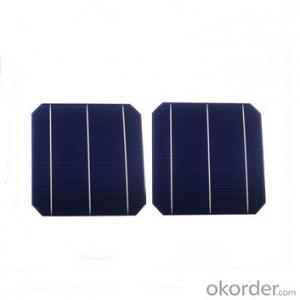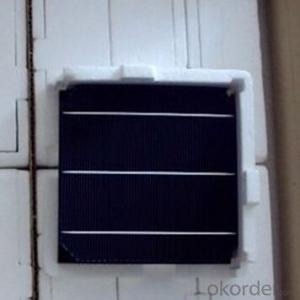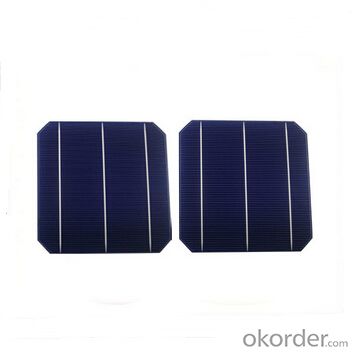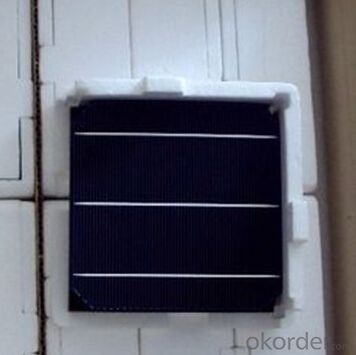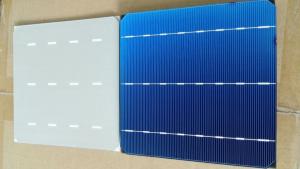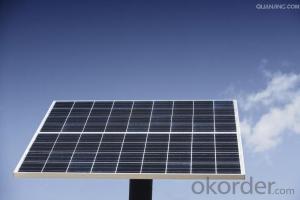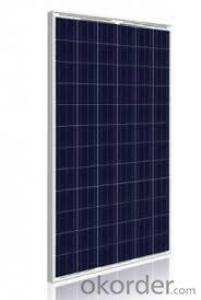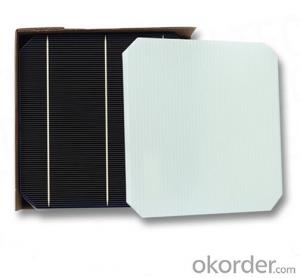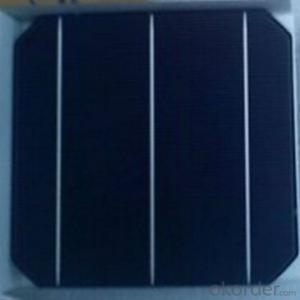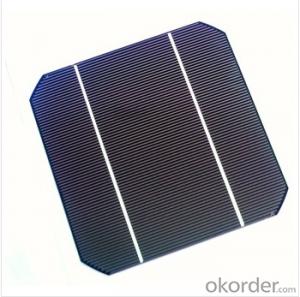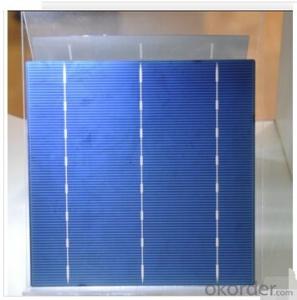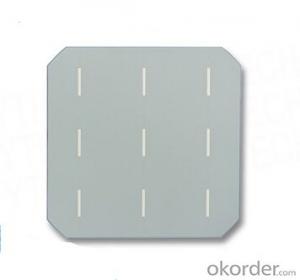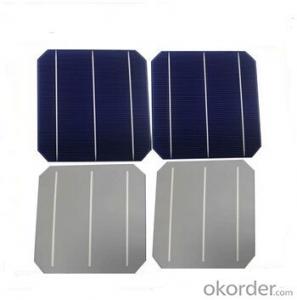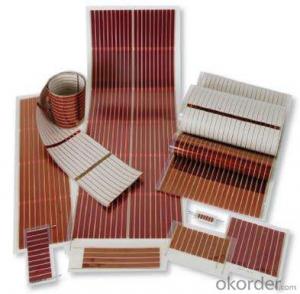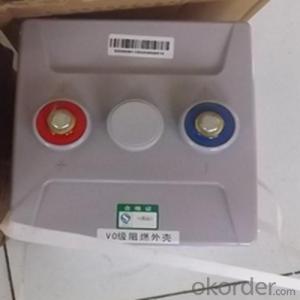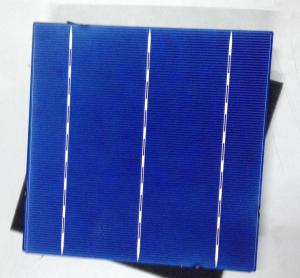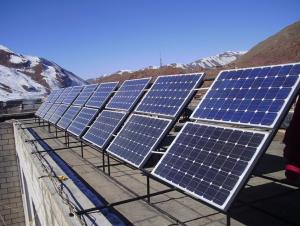Uav Solar Cells - Monocrystalline Solar Cells Series- 18.00%
- Loading Port:
- Shanghai
- Payment Terms:
- TT OR LC
- Min Order Qty:
- 1000 pc
- Supply Capability:
- 100000 pc/month
OKorder Service Pledge
OKorder Financial Service
You Might Also Like
Solar Cells:
Solar cells is made by solar wafer, it has three categories of solar cell right now, monocrystalline polycrystalline and thin film,These cells are entirely based around the concept PNjunction, which is the critical part of solar module, it is the part that can convert the light energy into electricity, the thickness is from 180um to 200um, with even busbars to conduct electricity, textured cell can decrease diffuse reflection; they are often electrically connected and encapsulated as a module. Photovoltaic modules often have a sheet of glass on the front (sun up) side, allowing light to pass while protecting semiconductor wafers from abrasion and impact due to wind-driven debris, rain, hail, etc. Solar cells are also usually connected in series in modules, creating an additive voltage. Connecting cells in parallel will yield a higher current;With high quality and stable quality. Our Cells can greatly improve the performance of Solar Modules.
Features:
High conversion efficiencies resulting in superior power output performance.
Outstanding power output even in low light or high temperature conditions
Optimized design for ease of soldering and lamination
Long-term stability,reliability and performance
Low breakage rate
Color uniformity
Specifications:
Efficiency | Power | Max Power Current | Min Power Current | Max Power Voltage | Short Circuit Current | Open Circuit Voltage |
Eff(%) | Ppm(W) | Ipm(A) | Ipm(A) | Vpm(V) | Isc(A) | Voc(V) |
19.0-19.19 | 4.54 | 8.56 | 8.44 | 0.536 | 9.05 | 0.640 |
18.80-18.99 | 4.49 | 8.53 | 8.36 | 0.534 | 9.00 | 0.639 |
18.60-18.79 | 4.44 | 8.50 | 8.32 | 0.532 | 8.97 | 0.637 |
18.40-18.59 | 4.40 | 8.46 | 8.29 | 0.530 | 8.95 | 0.636 |
18.20-18.39 | 4.35 | 8.42 | 8.23 | 0.527 | 8.93 | 0.635 |
18.00-18.19 | 4.31 | 8.34 | 8.20 | 0.523 | 8.90 | 0.634 |
Product | Monocrystalline silicon solar cell | |||||
Dimension | 156mm×156mm ±0.5mm | |||||
Diagonal | 200mm±1.0mm(Round chamfers) | |||||
Thickness(Si) | 200µm±15µm | |||||
Front | Blue silicon nitride antireflection coatings 1.4~1.6mm silver busbar ,3BB | |||||
Back | Full-surface aluminum back-surface field 2.6mm silver continuous or discrete soldering pads | |||||
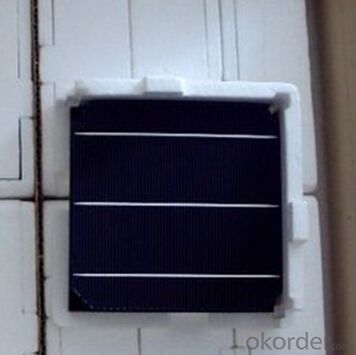
Solar Cells Advantage:
• High efficiency and stable performance in photovoltaic conversion.
• Advanced diffusion technique ensuring the homogeneity of energy conversion efficiency of the cell.
• Advanced PECVD film forming, providing a dark blue silicon nitride anti-reflection film of homogenous color and attractive appearance.
• High quality metal paste for back surface and electrode, ensuring good conductivity, high pulling strength and ease of soldering.
• High precision patterning using screen printing, ensuring accurate busbar location for ease with automatic soldering a laser cutting.
FAQ
We have organized several common questions for our clients,may help you sincerely:
①What price for each watt?
It depends on the efficiency of the solar cell, quantity, delivery date and payment terms.
②How long can we receive the product after purchase?
In the purchase of product within three working days, We will arrange the factory delivery as soon as possible. The pecific time of receiving is related to the state and position of customers.Commonly 7 to 10 working days can be served.
③Can you provide the peripheral products of the solar panels, such as the battery, controller, and inverter? If so, can you tell me how do they match each other?
Yes, we can, we have two companies for solar region, one is CNBM International, the other is CNBM engineering Co.
We can provide you not only the solar module but also the off grid solar system, we can also provide you service with on grid plant.
④What is your warranty of solar cell?
Our product can promise lower than 0.3% open box crack, we support claim after opening the box if it has crackm color difference or sth, the buyer should give pictures immediately, we can not accept the claim after the solar cell has assembled to solar panel.
• Timeliness of delivery
• ⑤How do you pack your products?
We have rich experience on how to pack the solar cell to make sure the safety on shipment, we could use wooden box or pallet as buyer's preference.
- Q: How do solar cells handle power fluctuations in remote areas?
- Solar cells can handle power fluctuations in remote areas by using a combination of energy storage systems such as batteries, inverters, and charge controllers. These components work together to store excess energy generated during peak sunlight hours and provide a stable power supply even during periods of low sunlight or high demand. This ensures a consistent and reliable power output, making solar cells an effective solution for addressing power fluctuations in remote areas.
- Q: Can solar cells be used in smart grid systems?
- Yes, solar cells can definitely be used in smart grid systems. Solar cells can generate electricity from sunlight, which can then be integrated into the smart grid to efficiently distribute and manage renewable energy. This allows for the seamless integration of solar power into the grid, reducing reliance on conventional energy sources and promoting a more sustainable and reliable energy system.
- Q: Is silicon-based solar cells and silicon-based thin-film solar cells the same?
- Monocrystalline silicon polysilicon battery components with tempered glass panel aluminum alloy frame when the flat, hard board. Soft with flexible material, thin battery is a soft board
- Q: Can solar cells be used to power air conditioning systems?
- Yes, solar cells can be used to power air conditioning systems. Solar panels can generate electricity from sunlight, which can then be used to power various appliances including air conditioning units. This offers a sustainable and renewable energy solution, reducing reliance on traditional power sources and contributing to a greener environment. However, it is important to note that the efficiency and capacity of solar cells may limit their ability to fully power larger air conditioning systems.
- Q: How do solar cells handle power factor correction?
- Solar cells do not handle power factor correction directly. Power factor correction is typically handled by other components in a solar power system, such as inverters or power conditioning units. These components are responsible for converting the DC power generated by solar cells into AC power that can be used in electrical systems. Power factor correction is important to ensure efficient utilization of electrical power and reduce energy losses in the system.
- Q: Want to use solar panels and batteries to produce a power supply that can provide a stable voltage, how can you connect? Can you connect directly with the solar panel to the battery while the battery power supply is feasible?
- Solar cells and battery connection, it is best to use a photovoltaic charging controller, which can control the output voltage of solar cells can protect the battery is not overcharge, but also at night when the solar cell does not generate electricity, to prevent the battery power back
- Q: How do solar cells handle fluctuating sunlight intensity?
- Solar cells are designed to handle fluctuating sunlight intensity by using a variety of techniques. One common approach is the use of maximum power point tracking (MPPT) algorithms, which constantly adjust the operating voltage and current to maximize the power output of the solar cell. Additionally, solar cells are often connected in series or parallel to create a larger array, which helps to average out the fluctuations in sunlight intensity. This combination of MPPT algorithms and array configuration enables solar cells to efficiently adapt and generate electricity even in varying light conditions.
- Q: Do solar cells require maintenance?
- Yes, solar cells do require some maintenance. Regular cleaning of the solar panels to remove dust, debris, or any shading objects is necessary to ensure optimal sunlight absorption. Additionally, occasional inspection and maintenance of the electrical connections, inverters, and batteries (if present) may be required to ensure efficient and uninterrupted operation.
- Q: How much does a solar cell cost?
- If you want to know how much a solar cell cost, it might take you longer time than you thought.
- Q: How are solar cells installed on rooftops?
- Solar cells are typically installed on rooftops using a mounting system that secures the panels in place. This involves attaching metal brackets or rails onto the roof, which act as the support structure for the solar panels. The panels are then placed onto these brackets and secured using clamps or screws. The installation process requires careful positioning and alignment to ensure maximum sunlight exposure for efficient energy generation.
Send your message to us
Uav Solar Cells - Monocrystalline Solar Cells Series- 18.00%
- Loading Port:
- Shanghai
- Payment Terms:
- TT OR LC
- Min Order Qty:
- 1000 pc
- Supply Capability:
- 100000 pc/month
OKorder Service Pledge
OKorder Financial Service
Similar products
Hot products
Hot Searches
Related keywords
